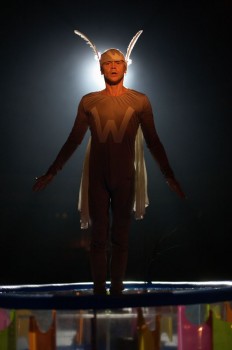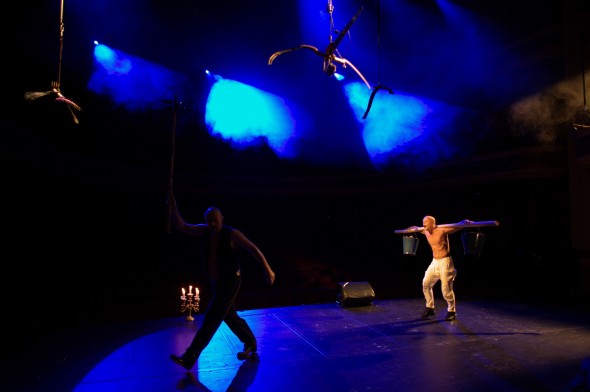Is it a play, is it a book?
25 February 2011 | This 'n' that

On the way to fame: Walt the Wonder Boy in Kristian Smeds's stage adaptation of Paul Auster's novel Mr. Vertigo at the Finnish National Theatre (2010). Photo: Antti Ahonen
Dramatisations of novels are tricky. Finnish theatremakers like adapting novels for the stage, which often results in a lot of talking instead of action – and action here doesn’t refer to just physical movement but to the subtext, to what happens under and behind the words.
Currently an adaptation of an American novel is running on the main stage of the Finnish National Theatre in Helsinki. Mr Vertigo (1994), Paul Auster’s seventh book, tells the story of an orphan boy in the 1930s St Louis. After harsh years as the long-suffering apprentice of the mysterious Master Yehudi, Walt becomes the sensational Wonder Boy by learning how to levitate.
In theatremaker Kristian Smeds’s adaptation, Auster’s whimsical, rambling novel becomes a capricious, illusory journey about illusions, freedom, and the unattainability of love. Walt (the highly expressive, athletic Tero Jartti) interprets, with hilarious comedy as well as with touching desperation, both the dizzyingly powerful experience of creativity and the ridiculous hubris of the artist.
The spectators find themselves spending most of the evening on the benches of the revolving stage or around it, claustrophobically shut in by the heavy iron curtain – at times in mere candlelight, wheeled along to the capriciously flowing, cool yet sensual tunes of a live jazz band.
Auster’s story contains violence, death and departures, so the last scene becomes drenched with melancholy – until the grand finale does away with all grief, as the Wonder Boy appears, flying high up above the second gallery, cavorting and diving graciously, weightlessly, joyously in the air! Miracles do happen – in the theatre at least, and this play just couldn’t do without them. People leave the theatre smiling, with sort of a misty gaze in their eyes…
The venerable 111-year old venue becomes a weird universe of illusions, the deserted auditorium filling occasionally with surreal visions and lights. It is as if the theatre itself were one of the characters of this journey into the story, peopled with a range of quite un-Austerian characters – dead Finnish actresses, for example. Smeds (born 1970) is known to be fond of meta-theatre and uninhibited trickstery.
Mr Vertigo will travel to St Petersburg in April to a theatre festival where its appeal to international audiences will be tested.
![]()
Sofi Oksanen wrote a play entitled Puhdistus (Purge) that was premiered at the National Theatre in Helsinki in 2007. The following year she published a novel with the same title: in considerably more words, it painted a much richer, detailed and rounded picture of the story. Could it be said that in this case the novel was an ‘adaptation’ of the play?
It is 1992, Estonia: old Aliide Truu lives in a small cottage. In the past she has experienced the horrors of the Stalin era and the deportation of Estonians to Siberia. A young woman appears in her yard, having escaped from the claws of the Russian mafia who held her as a sex slave. It turns out that Zara is Aliide’s grand-niece, and Aliide now has to come to terms with her past, to cope with the guilt of opportunism, even manslaughter. The sombre narrative is written in a richly detailed and eidetic style.
The novel has received a dizzying number of literary prizes, both in Finland and abroad. It has been sold into 34 countries. The original play has been staged in various countries. Half-Estonian, half-Finnish Oksanen (born 1977) has toured the world witnessing the success of Purge.
Purge was premiered at the prestigious La MaMa Theatre in New York City on 11 February, directed and staged by Zishan Ugurlu, translated by Eva Buchwald. This was the first time a Finnish play has been produced on a professional stage in New York.
Off-Off-Broadway shows don’t necessarily get a lot of coverage in the press; Purge was reviewed in few publications. Mitch Montgomery (Backstage) felt the production was uneven and ‘feels too shoddily staged for the script’s impact to register fully’, and that the set was preventing ‘full immersion in Oksanen’s weighty story at every turn’. TimeOut NYC critic said ‘the play demands solemnity, but the ham-fisted production often left me stifling giggles.’ Some spectators have expressed their confusion about the turns of the plot.
Perhaps the play’s historical and political milieu – 20th-century Estonia – was difficult to grasp, on both sides of the footlights. In this respect there were no problems in Estonia, Finland or Sweden. However, Purge will continue travelling, staged by other theatremakers, seen by new audiences.
![]()

Master Yehudi (Jukka-Pekka Palo, left) training Walt the Wonder Boy (Tero Jartti): Paul Auster's novel Mr. Vertigo adapted and directed by Kristian Smeds at the Finnish National Theatre. Photo: Antti Ahonen
Click here for short samples of Verneri Pohjola and his band’s music for Kristian Smeds’s Mr Vertigo.
No comments for this entry yet
